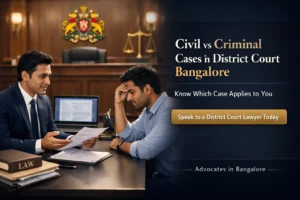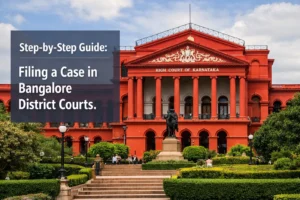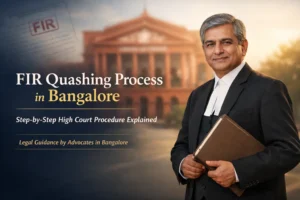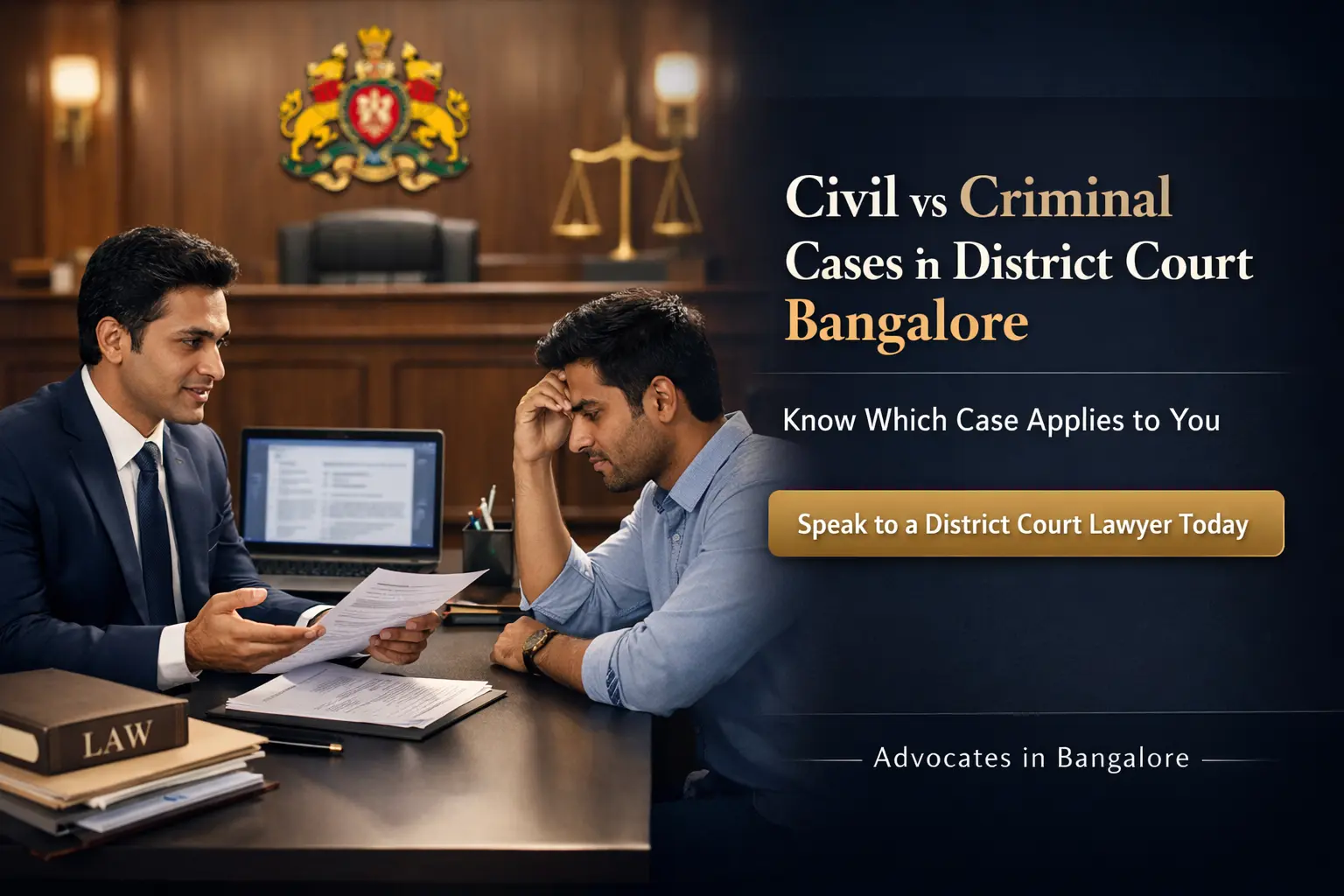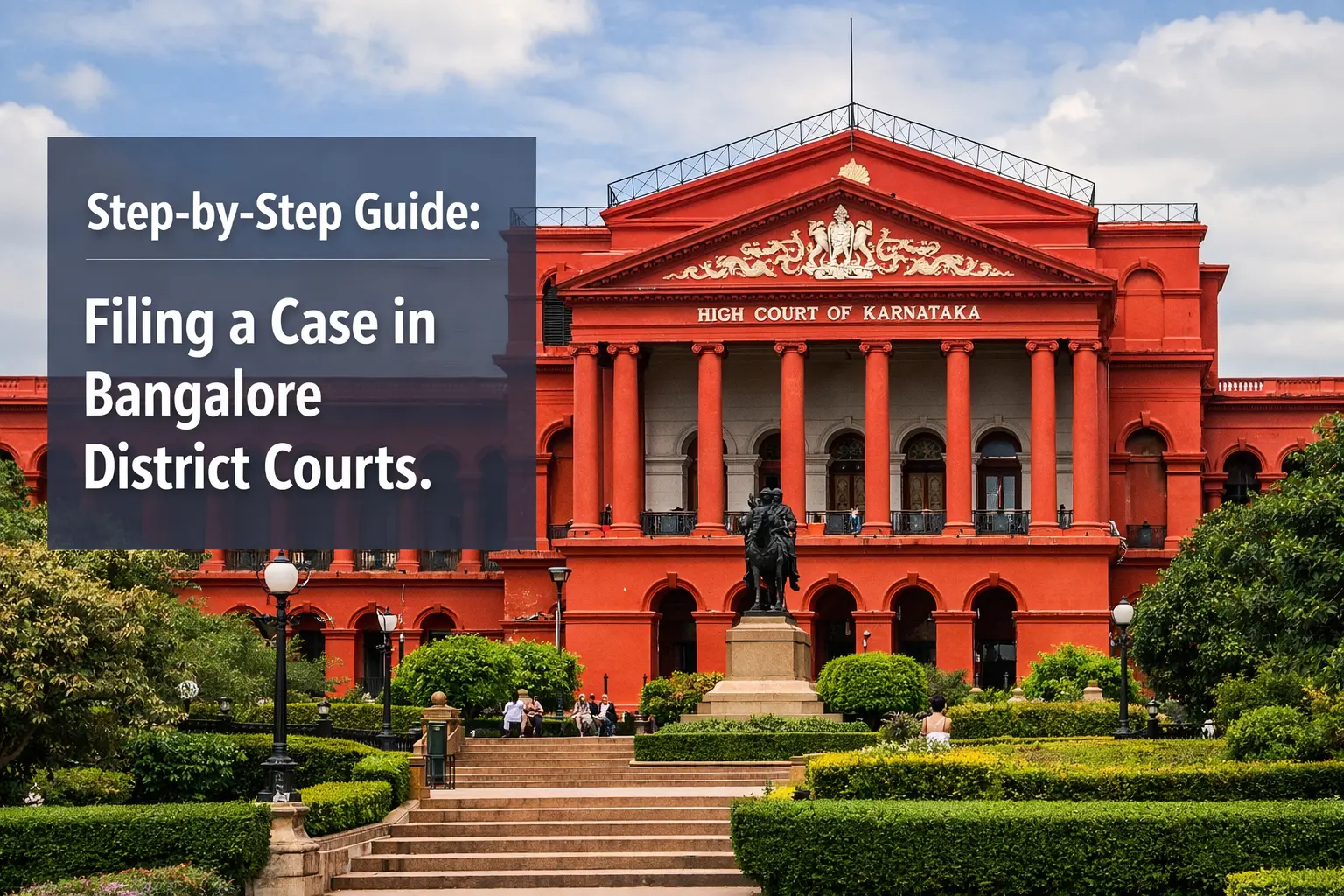
Bangalore’s dynamic economy is built on contracts. From software development deals to real estate transactions, these agreements are the lifeblood of business. But what happens when a party fails to uphold its end of the bargain? With commercial activity booming, and with it, contract disputes, understanding the available remedies for breach of contract in Bangalore is no longer just for lawyers, it’s essential for any savvy business owner, entrepreneur, or property investor. This guide provides a clear roadmap to your legal options, explaining what you can claim, the realistic outcomes, and when to seek expert legal counsel.
Has a broken contract disrupted your business or personal investment? Don’t wait for the problem to escalate. Call Advocates in Bangalore at +91-9886747301 for an immediate consultation.
Table of Contents
- A Quick Primer: What Constitutes a Breach?
- Overview of Legal Remedies Available Under Indian Law
- Damages: A Deep Dive into Monetary Compensation
- Specific Performance: Forcing the Contract’s Fulfilment
- Injunctions: How to Legally Stop an Action
- Rescission, Restitution & Quantum Meruit
- Handling Anticipatory Breach: Acting Before the Damage is Done
- Understanding Damages under Section 73 of the Indian Contract Act
- Sector-Specific Remedies: Service Agreements & Real Estate
- Cost-Effective Strategies: ADR and Settlement
- How Advocates in Bangalore Can Secure Your Rights
- Frequently Asked Questions (FAQs)
A Quick Primer: What is a Breach & Its Legal Framework?
Before exploring remedies, it’s crucial to identify if a breach has occurred. The Indian Contract Act, 1872, governs these agreements. A breach is essentially a failure by one or more parties to perform their contractual obligations.
- Definition: A breach of contract is the violation of any agreed-upon term or condition without a valid legal excuse.
- Types of Breach:
- Actual Breach: Failure to perform on the due date.
- Anticipatory Breach: A clear indication that a party will not perform before the due date arrives.
- Material Breach: A significant violation that strikes at the very heart of the contract, defeating its purpose.
- Minor Breach: A less severe violation that doesn’t nullify the entire agreement.
Actionable Takeaway: The first step is to assess if the breach is “material.” This determination is critical as it dictates the range of available legal remedies for breach of contract in Bangalore.
Overview of Remedies Available Under Indian Law
When a contract is breached, Indian law provides several avenues for the aggrieved party. The goal is to put you back in the position you would have been in had the contract been fulfilled, or to compensate you for your losses. Recent trends show a rising preference for alternative dispute resolution; in 2024-25, a significant percentage of Bangalore’s commercial disputes are being routed through mediation and arbitration for faster resolution.
Here are the primary remedies:
- Damages: Monetary compensation for the loss suffered.
- Specific Performance: A court order compelling the breaching party to perform their promise.
- Injunction: A court order restraining a party from doing a specific act.
- Rescission: Cancellation of the contract, restoring parties to their original positions.
- Quantum Meruit: Payment for the value of work already done.
Damages: Monetary Compensation Explained
For most businesses, recovering financial losses is the primary goal. Damages are the most common remedy awarded by courts.
Compensatory Damages (Expectation Loss)
This aims to cover the direct loss caused by the breach. To claim this, you must prove that the loss was a foreseeable result of the breach, a principle established in the landmark case of Hadley v. Baxendale.
- Heads of Loss: Includes direct losses (e.g., cost of replacement goods) and consequential losses (e.g., lost profits).
- Example: A Bangalore-based software firm fails to deliver a CRM tool on time, causing their client to lose a major sales contract. The client can sue for the lost profits, as this was a foreseeable consequence of the delay.
Liquidated Damages vs. Penal Clauses
Contracts often include a clause specifying a pre-agreed amount of damages to be paid upon a breach.
- Liquidated Damages: An enforceable, genuine pre-estimate of the likely loss.
- Penalty Clause: An unenforceable, excessive amount meant to terrorize the other party into performance. Drafting Tip: To ensure your clause is treated as liquidated damages, make sure the amount is a reasonable and justifiable estimate of potential losses.
Nominal & Exemplary Damages
These are less common in contract law. Nominal damages are a small, symbolic sum awarded when a legal right has been violated but no real financial loss has occurred. Exemplary (or punitive) damages are rare and intended to punish the breaching party, not just compensate the victim.
Specific Performance & Equitable Relief
Sometimes, money isn’t enough. Courts may grant equitable relief like specific performance when damages are an inadequate remedy.
When Courts Order Specific Performance
This remedy is common in cases involving unique goods or assets. The court will order specific performance only if:
- The subject matter is unique (e.g., a rare piece of art, a specific plot of land).
- Monetary compensation would not be sufficient.
- Performance of the contract is possible and does not cause undue hardship.
Real Estate Focus: What Buyers in Bangalore Can Claim
This is highly relevant for property disputes. If a seller in Bangalore backs out of an agreement to sell a property, the buyer can sue for specific performance to compel the seller to execute the sale deed. In complex areas like Rajajinagar, where title issues can arise, securing specific performance is critical. At Advocates in Bangalore, we specialise in property due diligence to prevent such disputes.
Injunctions: Stop the Other Side
An injunction is a court order that either prohibits a party from doing something (a prohibitory injunction) or compels them to do something (a mandatory injunction).
Interim (Interlocutory) Injunctions – Urgent Relief
This is a temporary order granted to preserve the status quo while a case is ongoing. Bangalore courts apply a three-part test:
- Prima Facie Case: You must show a strong, arguable case.
- Balance of Convenience: The inconvenience to you must be greater than the inconvenience to the other party.
- Irreparable Harm: You must show you would suffer harm that cannot be compensated by money.
Perpetual Injunctions – Permanent Relief
Granted after a full trial, this permanently restrains a party, such as preventing a former employee from breaching a non-compete clause in their employment contract.
Rescission, Restitution & Quantum Meruit
These remedies focus on undoing the contract and preventing unjust enrichment.
- Rescission: The contract is cancelled entirely.
- Restitution: The breaching party must return any money or benefit they unfairly received.
- Quantum Meruit (“as much as he has earned”): This allows a party to be paid for the reasonable value of services rendered before the contract was terminated.
- Example: A contractor completes 60% of a commercial construction project in Bangalore before the owner wrongfully repudiates the contract. The contractor can claim payment for the work already done under quantum meruit.
Anticipatory Breach – Act Early
When a party clearly states they will not perform their obligations before the due date, you don’t have to wait for the breach to happen. You have two options:
- Accept the Repudiation: Treat the contract as terminated and immediately sue for damages.
- Wait and See: Keep the contract alive and wait for the performance date, hoping the party changes its mind.
Practical Advice: For businesses, serving a legal notice immediately often saves time and shows intent, paving the way for a quicker resolution than waiting.
Remedies under Section 73 Indian Contract Act – Calculating Damages
Section 73 of the Indian Contract Act, 1872 is the cornerstone for calculating damages in India. It states that the party who suffers from a breach is entitled to compensation for any loss or damage which naturally arose in the usual course of things from such breach.
- Key Principles:
- Foreseeability: The loss must be a foreseeable result of the breach.
- Mitigation: The injured party has a duty to take reasonable steps to minimize their losses.
- Proof: You must be able to prove the extent of your financial loss.
This is one of the key remedies under Section 73 Indian Contract Act Bangalore businesses rely on to recover their losses effectively.
Sector-Specific Notes: Service Agreements & Real Estate
Remedies for Breach of Service Agreement in Bangalore
For the IT and service sectors in Bangalore, contracts are paramount. Common breaches involve non-payment, confidentiality violations, or failure to meet service levels. Remedies often include claiming unpaid invoices, enforcing liquidated damages for delays, and seeking injunctions to prevent data theft. These are vital remedies for breach of service agreement in Bangalore.
Remedies for Breach of Contract for Real Estate in Bangalore
The real estate sector sees frequent disputes over delayed possession, construction defects, or title issues. Buyers can sue for specific performance, claim damages for delays, or approach regulatory bodies like RERA. Understanding the specific remedies for breach of contract for real estate in Bangalore is crucial for protecting your investment.
ADR, Settlement & Cost-Effective Strategies
Litigation can be time-consuming and expensive. Alternative Dispute Resolution (ADR) offers a practical alternative.
- Mediation/Conciliation: A neutral third party helps both sides reach a mutually agreeable settlement.
- Arbitration: A private tribunal hears the case and delivers a legally binding award. Benefit: ADR is faster, confidential, and often more cost-effective than traditional court proceedings.
How Advocates in Bangalore Helps You
Navigating contract disputes requires expertise and strategic action. At Advocates in Bangalore, we protect your interests at every stage.
- What We Do:
- Comprehensive case evaluation and legal opinion.
- Drafting and serving legally sound notices.
- Filing suits for damages, specific performance, and injunctions.
- Representing you in arbitration and mediation.
- Negotiating favourable settlements.
“We prioritise early mitigation and strategic negotiation. A well-drafted legal notice can often resolve a dispute before it ever reaches the courtroom, saving our clients significant time and legal spend.” – Senior Partner, Advocates in Bangalore.
Our on-ground knowledge of procedures in Bangalore courts, including jurisdictions like Vijaynagar, gives our clients a distinct local advantage.
Don’t let a breached contract derail your success.
Call Advocates in Bangalore for a Consultation
Visit our Google My Business Listing for reviews and updates.
Get Directions of our office
Frequently Asked Questions (FAQs)
1. What remedies are available for breach of contract in Bangalore?
The primary remedies include monetary damages, specific performance (forcing the action), injunctions (stopping an action), rescission (cancellation), and quantum meruit (payment for work done).
2. How long do contract breach cases take in Bangalore courts?
Timelines can vary from several months to a few years, depending on the complexity and court workload. ADR methods like arbitration are significantly faster, often concluding within 6-12 months.
3. Can I claim lost profits for a breached contract?
Yes, you can claim lost profits (consequential damages) if you can prove they were a foreseeable result of the breach and you can quantify the amount with reasonable certainty.
4. When will a court order specific performance in a property dispute?
A court will typically order specific performance in a property dispute when the property is unique and monetary damages would not be an adequate remedy for the buyer.
5. What is Section 73 and how does it affect damages?
Section 73 of the Indian Contract Act is the law that allows the aggrieved party to claim compensation for losses that naturally arose from the breach. It forms the legal basis for calculating damages.
6. Should I try mediation before filing a suit in Bangalore?
Yes, trying mediation is often a practical and cost-effective first step. It can lead to a faster, mutually agreeable resolution while preserving business relationships, which is a significant advantage over adversarial litigation.
Take Control of Your Contractual Rights
A broken promise in business can have cascading effects. Understanding the legal remedies for breach of contract in Bangalore empowers you to act decisively, protect your financial interests, and enforce your rights. By moving quickly and strategically, you can mitigate losses and hold the other party accountable. Remember, a well-drafted contract is your first line of defense, but knowing your remedies is your ultimate safety net.
What is the biggest challenge you’ve faced when dealing with a broken contract? Share your experience in the comments below!

I am Anjan Kumar, the founder of Advocates in Bangalore, a trusted law firm with over 15 years of legal experience and 12,000+ satisfied clients across Bangalore and Karnataka. Specializing in criminal law, divorce law, property disputes, and corporate legal matters, we handle High Court, District Court, and Family Court cases with professionalism and tailored solutions.
Our team has successfully represented 12,000+ clients, earning a reputation as trusted advocates in Bangalore. We operate 24/7, providing expert legal guidance and strong court representation.
At Advocates in Bangalore, we believe in honest communication, ethical practices, and results. We’re here to protect your rights with integrity.
For legal consultation: contact us at anjankumar5328@gmail.com | Call: +91-9886747301

